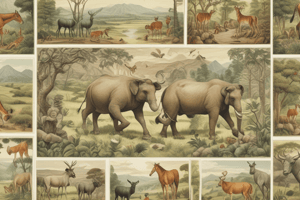Podcast
Questions and Answers
What were sanctuaries used for besides worship?
What were sanctuaries used for besides worship?
Sale, exchange, and keeping valuables
How were sanctuaries similar to modern banks?
How were sanctuaries similar to modern banks?
Community managed the wealth like a modern bank
Why were the earliest sanctuaries considered sacred?
Why were the earliest sanctuaries considered sacred?
Resources belonging to deities were kept there
What was the purpose of sanctuaries in terms of economy?
What was the purpose of sanctuaries in terms of economy?
What term was used to describe sanctuaries that regulated exchange with foreigners?
What term was used to describe sanctuaries that regulated exchange with foreigners?
What type of sanctuary was Pyrgi known as?
What type of sanctuary was Pyrgi known as?
What was the main purpose of leaving a donation at the sanctuary?
What was the main purpose of leaving a donation at the sanctuary?
Why did people from different regions like Phoenicians and Near Easterns visit the sanctuary?
Why did people from different regions like Phoenicians and Near Easterns visit the sanctuary?
What was the significance of the sanctuary in terms of unity among different groups?
What was the significance of the sanctuary in terms of unity among different groups?
What was the early form of 'taxation' expected from traders visiting the sanctuary?
What was the early form of 'taxation' expected from traders visiting the sanctuary?
Study Notes
Sanctuaries Beyond Worship
- Sanctuaries served as a safe place for storing valuable items, similar to modern banks, providing a secure environment for the storage and protection of goods.
- They played a crucial role in facilitating economic transactions, with the earliest sanctuaries being considered sacred due to their association with the gods and goddesses.
Economic Significance
- Sanctuaries played a vital role in the economy, serving as centers for trade, commerce, and financial transactions.
- They regulated exchange with foreigners, earning the term "emporion" to describe this function.
- Pyrgi, for instance, was known as an "emporion" sanctuary.
Donations and Offerings
- Leaving a donation at the sanctuary was a way for individuals to express gratitude, seek divine favor, or commemorate important events.
- The donations often took the form of precious items, such as gold, silver, or other valuable goods.
Unity and Connectivity
- Sanctuaries attracted visitors from diverse regions, including Phoenicians and Near Easterners, who came to engage in trade, commerce, and cultural exchange.
- The sanctuaries played a significant role in fostering unity among different groups, providing a common platform for interaction and cooperation.
Early Taxation
- An early form of "taxation" was expected from traders visiting the sanctuary, where they would offer a portion of their goods or profits as a form of tribute or taxation.
Studying That Suits You
Use AI to generate personalized quizzes and flashcards to suit your learning preferences.
Description
Test your knowledge on sanctuaries and cult places which were not just places of worship, but also served as locations for festivals, trade, and storing valuables. Learn about how these early sanctuaries were like modern banks managed by the community, and why they were considered sacred.



